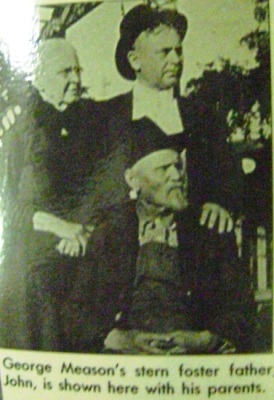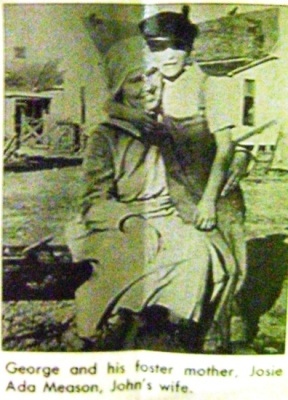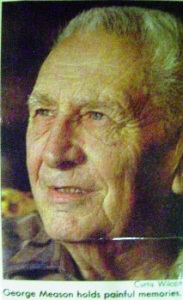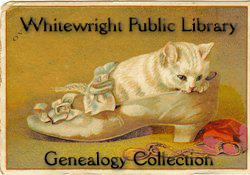George Meason
But his memories of John S. and
Josie Ada Meason are vivid and they begin at
the Whitewright train depot.
"That was my
introduction to my new family," he said. "My
new mother gave me quite a licking before we
ever left the railroad station."
Once ensconced
in the Meason home, George found that his
new parents were a winter-spring couple
with no other children. His adoptive
mother was 24 and his new father was in
his mid-40s. They were in close agreement
about child rearing, however. While Josie
Meason administered the first whipping,
George's new father gave most of the rest.
John Meason was a Christian Church
preacher with a wooden leg (the result of
a fall down a well) and a heart his son
described as being of equally pliant
material.
 |
 |
"I got a lot
of whippings," he said. "Some I deserved
and some I didn't, but they were pretty
decent to me when I was little. It was
just when I got a little older, especially
when the Depression came along, that
things got rough.
"My
father never passed up that 10 percent
discount," said Meason.
"It was customary in a lot of places
back then for a preacher to
get 10 percent off in businesses like a
grocery or dry goods store and
he always had his hand out for it."
"That was
understandable,
since the church didn't pay him that much,
but what he did with me
wasn't. They had me out working as
soon as I was big enough,
doing yards and chores for people, but I
didn't get to keep anything I
was paid. It all went back to them."
John Meason
was
semi-itinerant and the family moved often.
George, never a good
student, changed schools frequently and
had little time to make
friends. He also had lost all
contact with his sisters and brother
and heard nothing of them until he was
living in Dallas in the mid-1920s.
"Julius
and I hadn't seen each other in about five
years. he said. "A lady who
lived across the street from us knew I was
adopted and she kept looking
at me. Finally, she asked if I had a
brother who looked a lot
like me and I told her I did and she said
she thought she knew him,
that he was living in Sulphur Springs.
"She took me
out there to
see him and we got to spend a whole day
together. We didn't see
each other too often after that, but at
least I knew where he was."
The
Measons moved to Richardson when George
was 12 and he continued working
at odd jobs his parents found for him.
He had begun holding out
small amounts of his pay and "tips" and
purchased a few things for
himself, a five-dollar .22 caliber rifle
and an erector set and the
beginnings of a stamp and coin collection.
His father preached
and worked with the undertaker who managed
a hardware store and a
funeral home in the same building and
prepared bodies in the basement.
"I
remember a fellow got hit by a train there
one time when I was about 14
and my father and the undertaker had him
down there in the cellar and I
was with them," he said. "The
undertaker'd drained the blood out
of this man and was pumping embalming
fluid n him. The man's
blood was in a bib bucket and my father
handed me that bucket and told
me to take that bucket and told me to take
it tow miles down the train
tracks away from town where nobody' see me
dump it out.
"I
remember walking down those tracks trying
to hold that bucket out where
it wouldn't slosh on me. Holding it
out straight-armed and it was
getting on my anyway. I finally just
dumped it. I didn't
care who saw me. I went straight
back to that cellar and told
him, "You can whip me if you want to, but
I'll never do anything like
that again."
"He just
looked at me and he didn't whip me that
time."
The
family then moved to West Fork, Ark.,
where Meason completed high
school. He hadn't planned what he
would do after school, but his
foster parents had made the decision for
him. On graduation day
he learned that they . . .
TEXAN
KNOWS PAINFUL LEGACY OF ORPHAN TRAIN
FIRSTHAND
by Sarah
Westbrook
The Odessa
American
ODESSA - An old rag doll with
eyes sewn on and no mouth is more than a
keepsake for Odessean George Meason = it's
a part of his heritage.
The doll
symbolizes a faceless seperation of former
Orphan Train riders.
Mr. Meason was
one of 150,000 children who were orphans
during the immigration boom around the
turn of the century in New York City.
Through the Children's Aid Society of New
York, the children were sent on trains to
live with farming families in the West and
Midwest. The society was created by
Charles Loring Brace.
In 1916, Mr.
Meason was less than 2 years old when he
and his siblings were taken from their
parents in Brooklyn, N.Y. He said he
doesn't know why they were taken or much
about his birth parents.
After living in
several foster homes, Mr. Meason was taken
into the custody of the society at age 5.
He and his siblings were sent to the Brace
farm School in New York for training in
farming. Then Mr. Meason, his brother,
Julius, and his three sisters rode a train
to Whitewright, Texas.
Many children
lost their identities through the process,
Mr. Meason said. "When they put you on
that train, they put Jewish boys in
Catholic churches, they put Catholic kids
in Protestant churches and mixed it up,"
he said.
"I didn't know
for years I was German. People told me I
was French," Mr. Meason said.
He was taken in
by a preacher and his wife in Whitewright.
One of his sisters also was raised in
Whitewright. Another sister grew up in
Bailey, Texas, and he said he's not sure
where the other sister was raised. Julius
was sent to live with a family near
Sulphur Springs, Texas.
"When we got
off the train there in Whitewright and
they started to put my brother, Julius,
back on the train, we were clutching each
other and wouldn't let go." Mr. Meason
said. "They finally yanked him away from
me and we were both crying, and I was
saying, 'Don't take him, don't take him.'"
After living in
several towns, Mr. Meason's foster family
moved to the Oak Cliff section of Dallas
when he was a teen-ager. It was then that
Mr. Meason found some information about
his brother.
"There was a
family that lived in the house right next
door to us. I was out mowing the yard,"
Mr. Meason said. "The lady just kept
staring and looking at me. About a day or
two later, she asked me if I had a brother
and my mother said yes. And she said,
"Does he live outside of Sulphur Springs
on a farm?" and my mother said yes. And
she said, "Is his name Julius?" and (my
mother) said yes," Mr. Meason recalls.
"And she said she had lived right across
from him."
Fifteen years
after they were separated, Mr. Meason went
to visit his brother.
Mr. Meason and
his family later moved to rural Arkansas.
After Mr. Meason completed high school, he
was informed by his parents that he would
join the Civilian Conservation Corps. The
corps was a work camp established in 1933
as a part of the New Deal to help
unemployed citizens.
"They said,
'Well, you're gonna go to the 3-C camp in
the morning, bright and early. Your going
to Fayetteville, and you're gonna be
shipped out."
"I said,
'Didn't I have a choice to say anything?'
And they said 'No.'"
While in the
civilian corps, Mr Meason worked in
forestry and farming programs.
Life at home
became difficult for Mr. Meason. "I hardly
ever went home because every time it was
"You got any money?" I don't know where
they thought I was gonna get a lot of
money. After 18 months, Mr. Meason was
discharged from the corps.
Mr. Meason and
his wife, Audie, came to Odessa in the
late 1930s from Bailey, Texas, looking for
work.
He said he was
asked once whether he liked his foster
parents. "I said, 'They gave me a home
when I was just a kid. But when you're a
kid and you're growing out from under
people who don't have any children ... you
get to be a burden and an expense to them,
and they realize that they made a
mistake,'" Mr. Meason said.
Although Mr.
Meason had an unsteady relationship with
the parents who raised him, he and his
wife took care of them in their later
years until they died.
"The hardest
part of it was the way that they were
using me. It got back to the same old
grind," he said.
Four years ago,
Mr. Meason saw his brother for the last
time and relived the time they were
separated as chldren. "The last time I saw
Julius alive, we had been to a meeting up
in Arkansas. When I left there, it was in
reverse," Mr. Meason said.


Susan
Hawkins
©2024
If
you find any of Grayson
County
TXGenWeb links
inoperable,
please send
me a
message.
|



